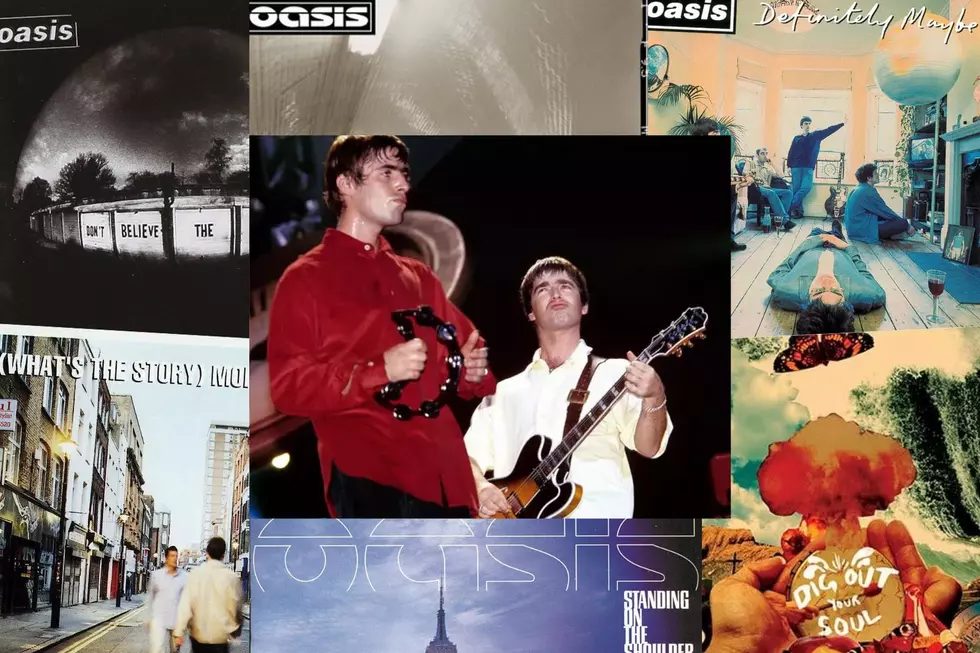
Unmasking Backmasking: Classic Rockers’ ‘Secret’ Messages
It must have been odd to hear Led Zeppelin in church, particularly one of the Fundamentalist Christian persuasion, but in the late ‘70s and early ‘80s, youth pastors around the country began playing “Stairway to Heaven” in services, to illustrate the Satanic messages they claimed the band had hidden in the song.
These messages could be heard when playing the song backward, they said, but the subliminal effect of the messages was said to be just as potent, even when the song was played in the usual direction, at regular speed.
Ridiculous, huh? There was, however, definitely a market in religious books, films and presentations in that period on the issue of backmasking — the alleged planting of subliminal messages in recordings, usually for dark purposes. It caused preachers and kids alike to ruin the belt drives on their turntables playing Led Zeppelin IV and dozens of other records backward.
Where did this stuff begin? Not entirely surprisingly, famed occultist and Fundamentalist bugaboo Aleister Crowley is credited with starting the whole thing. In his 1913 treatise on meditation, Magick: Book 4, Crowley promoted the idea of "listen[ing] to phonograph records, reversed," to train one’s brain to think backward. Subsequently, avant-garde composers such as John Cage and Edgard Varèse (a favorite of Frank Zappa) used reversed tape effects in their versions of musique concrète, or experimental music that used recorded sounds as quasi-instrumentation.
In rock ‘n’ roll, the effect became an important tool for experimentation in the late ‘60s, as musicians began using the studio to explore sounds that were more radical than the typical guitar/drums/bass/keyboard setup. The Beatles were probably the granddaddies of using tape effects — John Lennon was an unabashed fan of avant-garde artists, and incorporated their techniques first on “Tomorrow Never Knows,” the final song on 1966’s Revolver, and all through 1967’s Sgt. Pepper’s Lonely Hearts Club Band.
That experimentation, coupled with the elevated place the Beatles had in popular culture, led listeners to do odd things to their Beatles records. A widely believed urban legend that Paul McCartney had died sent some fans looking for clues in the music. Of course, they found what they were looking for; playing the “Number 9” segment of the White Album’s “Revolution 9” backward yielded a sound that resembled “Turn me on, dead man.” Backward spins of “I’m So Tired” led fans to hear “Paul is dead. Miss him, miss him.”
These were unintentional sounds made when one played the record in an unintended fashion. People heard what they wanted to hear, or what others suggested they hear.
Meanwhile, around the same time, Jimi Hendrix was making Electric Ladyland, an album that opened with “And the Gods Made Love,” a track that intentionally incorporated backmasking. Play the garbled voice on the song backward, and you hear Hendrix say, “Yes, yes, yes, I get it. Okay, one, okay, one more time.”
At some point in the next decade or so, Fundamentalist preachers took up backmasking as an example of Satanic influence in rock music, another method the pointy-tailed one used to degrade the morals of vulnerable youth, right under the noses (and ears) of their unsuspecting parents.
For example, fans of Electric Light Orchestra who bought 1974’s Eldorado for “Can’t Get It Out of My Head” would have allegedly received a Satanic message, had they flipped the album over and played the title track. Those with ears for these things played the lines "Here it comes, another lonely day / Playing the game. I'll sail away / On a voyage of no return to see" backward and heard "He is the nasty one — Christ you're infernal — It is said we're dead men — Everyone who has the mark will live."
E.L.O. frontman and mastermind Jeff Lynne got so sick of hearing questions about the alleged messages, he planted one in the band’s next album, Face the Music. A bit of gibberish in the intro to “Fire on High,” when played backward, is revealed to be drummer Bev Bevan saying, “The music is reversible, but time is not. Turn back. Turn back. Turn back. Turn back."
The Eagles’ 1976 hit “Hotel California,” one of the seminal songs of the decade, is said to have hidden in its first verse and chorus a message that includes “Satan had ‘em; he organized his own religion.”
Styx were accused of implanting a Satanic message (“Satan move in our voices”) in “Snowblind,” off 1981’s Paradise Theatre. That controversy provided the seed of an idea that led Dennis DeYoung to create the character of Dr. Righteous in 1983’s Kilroy Was Here, and to plant an intentional backmasked message in “Heavy Metal Poisoning.”
Cheap Trick, not exactly avowed devil worshipers, were said to have injected the message “Satan holds the keys to the lock” in their song “Gonna Raise Hell.”
Not all supposed backmasking was in praise of the devil. Queen’s international hit “Another One Bites the Dust” was said to contain a message encouraging listeners to “Decide to smoke marijuana.”
Not to be outdone by other artists allegedly doing creepy things on their records, Pink Floyd put a congratulatory message in “Empty Spaces,” on The Wall.
The whole thing got so silly, even "Weird Al" Yankovic got into the act, intentionally backmasking the message “Satan eats Cheez Whiz” on his 1984 album cut “Nature Trail to Hell.”
Accusations of backmasking reached a heated and tragic pitch in 1990, when Judas Priest were taken to court over the accusation that their lyrics and embedded backward messages had driven two fans to suicide. Attorneys argued that they heard the words “do it” in the song “Better by You, Better Than Me.”
Priest were exonerated of the charges; the band’s defense had proved their culpability so untenable as to cast backmasking from the courtroom back to the pulpit.
And thought there are still some who continue to find evil or naughty hidden messages in today’s pop music (Lady Gaga and Britney Spears, in particular, stand accused), the issue remains relegated to the minds of those who want to hear what they want to hear in a bunch of backward noise. In the end, that’s probably where the issue belongs.
More From Ultimate Classic Rock









